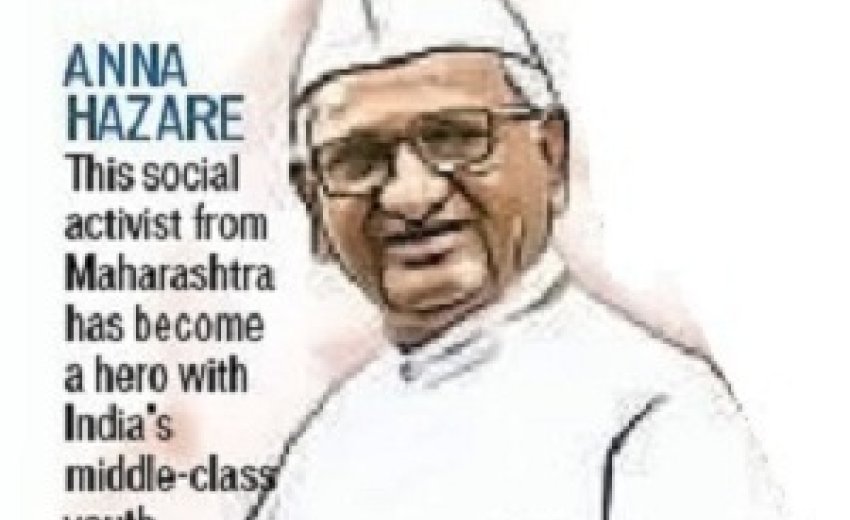D E L H I
'I paid a tout; it was worth it'
 ANKUSH WADHERA, 29 ANKUSH WADHERA, 29
business strategy consultant
Earlier this year, I lost my driver's licence and went to the licence office in Sheikh Sarai to have a new one made.
I was told to fill out a form and return
in about two weeks to find out if my
case number had come up. If not, I would
have to return every couple of days till
it did. Then I could begin the process
of getting my new licence. I explained
I travelled a lot on work and asked if
there was a way I could be told when
it was my turn at the counter. He said
there was no such system; if I missed
my turn, my file would automatically
go to the back of the queue and I would
have to wait another two weeks.
As I turned around to leave the counter,
I spotted a man who was clearly a
tout. I decided to ask him for help.
"Just file an FIR, give me your details
and R1,500 and I'll take care of it," he
said. As I handed over R1,000 as advance,
he told me to meet him the next time I
was in Delhi, pay the rest of the money
and I would get my licence the next day.
The next time I was in Delhi, I returned
to the licence office. My tout was ready
with all the forms. As soon as I gave him
the R500, his assistant strode to the
front of the long queue and slipped my
forms to the man behind the counter.
I stepped up for a photograph, and
the next day I had my licence.
It cost me R1,500 instead of R270,
but it was worth it. I see it from the
perspective of a service at a premium.
What choice did I have given the fastpaced
life I lead?
(As told to Shalini Singh) |
B A N G A LO R E
'The police were the worst'
 SUNEEL MN, 30 SUNEEL MN, 30
IT professional
My worst encounter was with the
police, when my motorcycle
caught fire. I had parked it in
my apartment complex and no one
knows how it happened.
I rushed to the local police station
to lodge a complaint but realised I was
at a great disadvantage because I was
a non-Kannadiga; I grew up in Delhi.
The policemen decided they did not
understand Hindi or English, instead
demanding that I lodge the complaint
in Kannada. I spent two hours pleading
with them.
I needed an FIR to pursue my insurance
claim, so I was forced to take time
off from work to visit the police station.
I went there six times before a
constable finally agreed, in fluent Hindi,
to take the complaint down in exchange
for R500. Then, my insurance company
told me I also needed a police closure
report to wrap up my claim.
So I had to visit the police station
seven more times, but still the police
would not help. Finally, a person claiming
to be an advocate approached me,
demanding R5,000 to get the desired
result. He said the policemen would
share this money among themselves.
The visits to the police station and
insurance office took a huge toll on my
work, so I finally decided to give up.
Four years later, I still have the charred
motorcycle as a reminder of the bribes
I paid.
I never received the insurance claim.
I drive a car now and pray that I never
need to approach the police again.
(As told to Salil Mekaad) |
| M U M B A I
'I can't fight alone, can I?'
SHOEB SHAIKH, 26
Technology specialist in a finance company
My first interaction with a police
official turned out to be my first
brush with corruption. I had
applied for a passport four years ago
and was told that the process would
take 30 days. The stated fee was R1,000.
But then I went to get my forms cleared
at the Kidwai Nagar police station near
Sewri (an area in central Mumbai).
Although all my documents were in
order, the police were lax about clearing
my application. The first time, I
simply did what everyone I knew had
done - I gave the official R100.
However, 25 days later, I realised my
form was still lying at the police station.
This time, the officials claimed I
had submitted more documents than
necessary and that I had different home
addresses on different papers. I realised
they were not satisfied with the money
I had handed over. They did not
explicitly ask for money, but people told
me not to argue with the police. So this
time, I gave them R500.
My passport arrived just 20 days
after that, a good three months after I
had first filled my application. Thanks
to the delay, I missed an opportunity
to travel abroad on work. Although I
was angry about having to pay a bribe,
we are all part of this corruption. I have
been caught driving my bike without a
helmet and the officer took R30. I did
not get a receipt and I know it went
into his pocket.
We allow the system to be corrupt,
but if I want to fight, who will support
me? I can't fight alone, can I?
(As told to Aarefa Johari) |
C H E N N A I
'I'm in an unequal battle'
S DURAIBABU, 51
director of a multinational company
In 2008, I bought a flat in Adyar (an
up-market residential locality in
Chennai) in my wife's name. We rented
it out. In 2009, the first tenant vacated
the flat, so I found another one,
finalised a lease agreement and handed
over the flat's keys to him.
But when he and his family arrived
there with all their belongings in a truck,
they found that the flat had been locked
from the inside. I made inquiries and
learnt that a man in an adjacent flat
had rented the flat out to someone else.
I was shocked to find that he had
managed to get the flat transferred in
his name even though my wife had been
paying the electricity bills and property
tax until then. I also learnt that he
had cheated four others in the housing
complex of 30 flats.
When I tried to register a complaint
against him, I discovered that this man
was very well-connected politically. So
it is an unequal battle that I am fighting.
Eventually, I got the police to register
a complaint against him. But I was
horrified at the extent of corruption
across government departments.
For the past two years, I have been
unable to concentrate on my work
because I have had to track the progress
of the case at different levels, make
rounds of police and administrative
offices and regularly file RTI applications.
If after so much education, exposure
and experience, I can land up in
this huge mess, I shudder to imagine
the plight of those who have fewer
resources.
(As told to KV Lakshmana) |
|
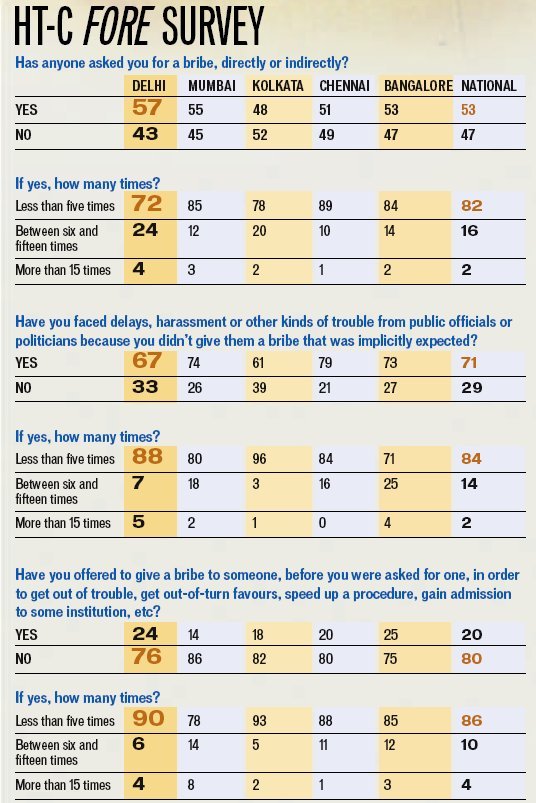 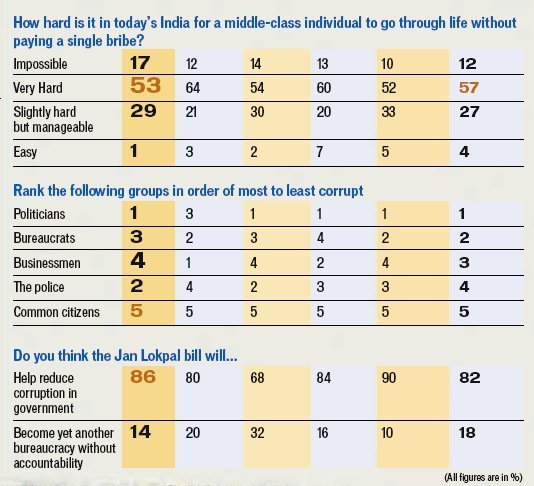
METHODOLOGY
Research organisation C fore conducted
the survey in Delhi, Mumbai, Kolkata,
Chennai and Bangalore on April 13 and 15.
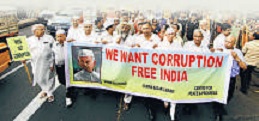
|
|
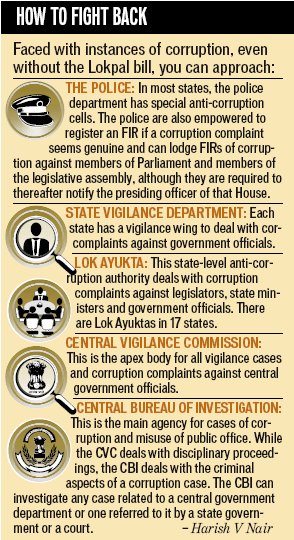 |
WHAT WILL THE JAN LOKPAL BILL DO? IT ENVISAGES CREATING an independent
body, a Lokpal, at the Centre to
probe corruption cases and complete
investigations within a year.
THE JAN LOKPAL WILL HAVE powers to
initiate action on its own or on the
basis of complaints from the
public. It does not have to
obtain the government's
permission. The government's
draft, however,
gives it the power only to
probe complaints forwarded
by the Speaker of
the Lok Sabha or the
Chairman of the Rajya
Sabha.
IT WILL HAVE police powers.
IT HAS TO ENSURE THAT the guilty go
to jail within two years of the complaint
being filed.
THOSE FOUND GUILTY will have to
compensate the government for the
losses caused by the corrupt practice.
JUDGES, CITIZENS and constitutional
authorities, not politicians, will select
the Lokpal's members through a transparent
and participatory process.
EXISTING ANTI-CORRUPTION agencies
such as the Central Vigilance Commission
and the CBI's anti-corruption branch will
be merged into the Lokpal.
- Harish V Nair
THE ROAD AHEAD
Exactly a week after anti-corruption crusader
Anna Hazare ended his hunger strike,
after the government conceded to his
demand that it form a joint committee to
draft a strong Lokpal bill, the first meeting of
the 10-member panel took place yesterday.
There was much bonhomie between both
sides, including between union minister
Kapil Sibal and lawyer Prashant Bhushan,
but this will have to translate into a working
relationship during the long and tedious
process of enacting the law. Hazare wants
the law to be notified by August 15, but a
complicated procedure has to be followed.
 THE GOVERNMENT IS including citizens for
the first time in the drafting of a major bill. THE GOVERNMENT IS including citizens for
the first time in the drafting of a major bill.
ONCE IT IS DRAFTED, the bill has to go to
Parliament during the monsoon session.
A PARLIAMENTARY PANEL WILL submit
recommendations to the government, which
is free to decide what to do with them.
THE LOK SABHA and the Rajya Sabha will
then debate and vote on the bill.
IF BOTH HOUSES PASS the bill, it will go to
the President to be notified as a law.
- Nagendar Sharma |
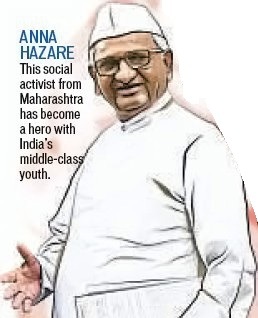 POTENTIAL
DANGERS  The body may
be overworked. The body may
be overworked.  It could
become a supercop
without
accountability. It could
become a supercop
without
accountability.  It could slow
down governance
because
officials might
think twice
before taking
action on
something. It could slow
down governance
because
officials might
think twice
before taking
action on
something. |
|




